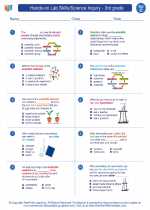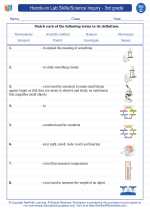Isolated Systems
An isolated system is a physical system that does not interact with its surroundings. This means that no energy or matter is exchanged between the system and its environment. Isolated systems are idealized in physics and are useful for understanding the behavior of closed systems.
Characteristics of Isolated Systems:
- No exchange of energy or matter: In an isolated system, there is no transfer of energy or matter across the system boundaries.
- Conservation of energy: Since no energy can enter or leave an isolated system, the total energy within the system remains constant over time, according to the law of conservation of energy.
- Conservation of mass: Similarly, the total mass within an isolated system remains constant, in accordance with the law of conservation of mass.
Examples of Isolated Systems:
While truly isolated systems are theoretical constructs, some real-world examples come close to behaving as isolated systems for practical purposes. These may include:
- The universe as a whole (as an isolated system, assuming no interactions with external universes)
- A sealed thermos flask containing hot coffee (for a short period of time, neglecting minimal heat exchange through the walls)
- An insulated, closed container of ideal gas undergoing an adiabatic process (where no heat enters or leaves the system)
Study Guide:
To understand isolated systems better, consider the following study guide:
- Define the concept of an isolated system and explain its key characteristics.
- Discuss the laws of conservation of energy and conservation of mass in the context of isolated systems.
- Provide examples of isolated systems in the real world and explain why they can be considered as such.
- Compare and contrast isolated systems with other types of systems, such as closed and open systems.
- Discuss the significance of isolated systems in physics and their utility in theoretical and practical applications.
By understanding isolated systems, you can gain insights into the fundamental principles of energy and matter conservation, as well as their applications in various scientific fields.
[Isolated Systems] Related Worksheets and Study Guides:
.◂Science Worksheets and Study Guides Third Grade. Hands-on Lab Skills/Science Inquiry - 3rd grade
Study Guide Hands-on Lab Skills/Science Inquiry - 3rd grade
Hands-on Lab Skills/Science Inquiry - 3rd grade  Worksheet/Answer key
Worksheet/Answer key Hands-on Lab Skills/Science Inquiry - 3rd grade
Hands-on Lab Skills/Science Inquiry - 3rd grade  Worksheet/Answer key
Worksheet/Answer key Hands-on Lab Skills/Science Inquiry - 3rd grade
Hands-on Lab Skills/Science Inquiry - 3rd grade  Worksheet/Answer key
Worksheet/Answer key Hands-on Lab Skills/Science Inquiry - 3rd grade
Hands-on Lab Skills/Science Inquiry - 3rd grade  Worksheet/Answer key
Worksheet/Answer key O-W-L
O-W-L  Vocabulary/Answer key
Vocabulary/Answer key Hands-on Lab Skills/Science Inquiry - 3rd grade
Hands-on Lab Skills/Science Inquiry - 3rd grade  Vocabulary/Answer key
Vocabulary/Answer key Hands-on Lab Skills/Science Inquiry - 3rd grade
Hands-on Lab Skills/Science Inquiry - 3rd grade 

 Worksheet/Answer key
Worksheet/Answer key
 Worksheet/Answer key
Worksheet/Answer key
 Worksheet/Answer key
Worksheet/Answer key
 Worksheet/Answer key
Worksheet/Answer key
 Vocabulary/Answer key
Vocabulary/Answer key
 Vocabulary/Answer key
Vocabulary/Answer key

The resources above cover the following skills:
Science as Inquiry and Process: A student should understand and be able to apply the processes and applications of scientific inquiry. A student who meets the content standard should:
Develop an understanding of the processes of science used to investigate problems, design and conduct repeatable scientific investigations, and defend scientific arguments.